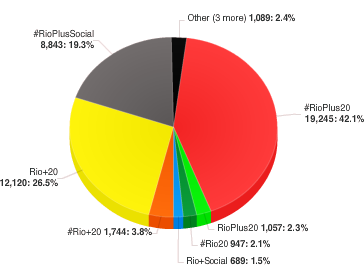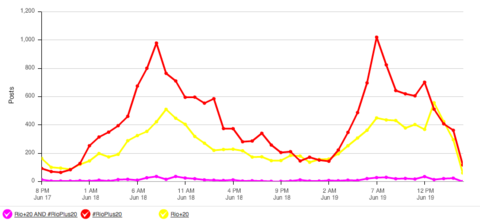By The Numbers: Which Rio+20 Hashtag Should You Use?
To receive the most attention, Upwell recommends that you include both Rio+20 and the hashtag #RioPlus20.
Yes, that's more characters. But we have reasons.
Although the Rio+20 Conference doesn't officially begin until tomorrow, the online conversation about the conference has been underway for days. This is especially noticeable on Twitter, with celebrities like Stephen Fry and band Linkin Park mentioning the event. Unfortunately, the conference's name—specifically its problematic use of the "+" character—has created some confusion about which Twitter hashtag is the correct one to use.
What are hashtags, and who chooses them?
If you know this already, feel free to skip ahead.
For the unfamiliar, a hashtag is a word within a tweet prefixed with a hash (#) sign, designed to provide an easy way to mark a tweet as having to do with a given topic or event. Originally an informal convention proposed by an early Twitter user, hashtags quickly gained widespread acceptance, and are now a ubiquitous part of the Twitter experience. More importantly, most Twitter clients, including Twitter's own web client, automatically recognize hashtags, turning them into clickable links, which easily allow users to search for other mentions of a given hashtag. This is a powerful method of discovery, enabling readers to recognize and quickly dive into a larger conversation.
However, since hashtags are a wholly emergent phenomenon—there's no "Hashtag Council" deciding which tags become the official ones, for example—it's important that Twitter users study each conversation they intend to join in order to determine which tags (if any) are already in use.
The "+20" gets ignored.
In the case of the Rio+20 Conference, this process has been complicated by the "+" character smack dab in the middle of the event's name. Why? Because Twitter doesn't recognize special characters within hashtags. As far as Twitter is concerned, a hashtag begins with the '#' character, and ends when it reaches any non alphanumeric character. Thus, when someone includes "#Rio+20" in a tweet, Twitter only sees the characters before the "+" as a valid hashtag. That is to say, only "#Rio" (the "+20" just gets ignored).
While some Twitter users are aware of this quirk, many are not. Consequently, the hashtag landscape for Rio+20 has become unusually fragmented, with no fewer than ten different tags (both with and without the hash character) appearing in Rio+20 tweets.
So what should you use? Let's look at some data.
Data is our favorite.

The chart above shows the total number of mentions/posts for the most popular Rio+20 hashtags in the past three days. Three tags are responsible for over 87% of the total volume.
- #RioPlus20 is the most popular tag, with 42% of the total volume and over 19,000 unique mentions. Note that, by writing out "+" as "plus", this tag neatly sidesteps the fragmented hashtag problem I described earlier.
- Rio+20 comes in second, with 26% of the total volume and 12,120 mentions. Technically, this is not a hashtag, as it isn't prepended by a "#" character, and its popularity is almost certainly due to people simply mentioning the name of the conference in their tweets.
- #RioPlusSocial is the third most popular tag, with 19% of volume and 8,843 mentions. (sidenote: This is a hashtag created by the conference organizers to foster a social conversation around sustainability. Why add another hashtag to the mix and further fragment the conversation? We don't know. Tell us in a comment if you do.)
Use them all.
Based on this, we recommend that you include both Rio+20 and the hashtag #RioPlus20 in your tweets. (And, if space permits, #RioPlusSocial as well.) Why all three? Take a look at the following graph:

Although #RioPlus20 (red line) and Rio+20 (yellow line) are each very popular, very few tweets mention them together (magenta line). There are effectively three separate groups of people speaking about Rio+20 online: two that have purposefully organized (one around the hashtag #RioPlus20, and another around the hashtag #RioPlusSocial) and a third "group" that is simply speaking about the conference by its official name.
This isolation presents a great opportunity for clever attention campaigners. By crafting content that intentionally bridges these groups, not only will your tweets be more likely to receive broader attention, you will also be helping to make each group aware of the others, a move that could potentially bump the entire Rio+20 conversation up even higher.

Add a comment